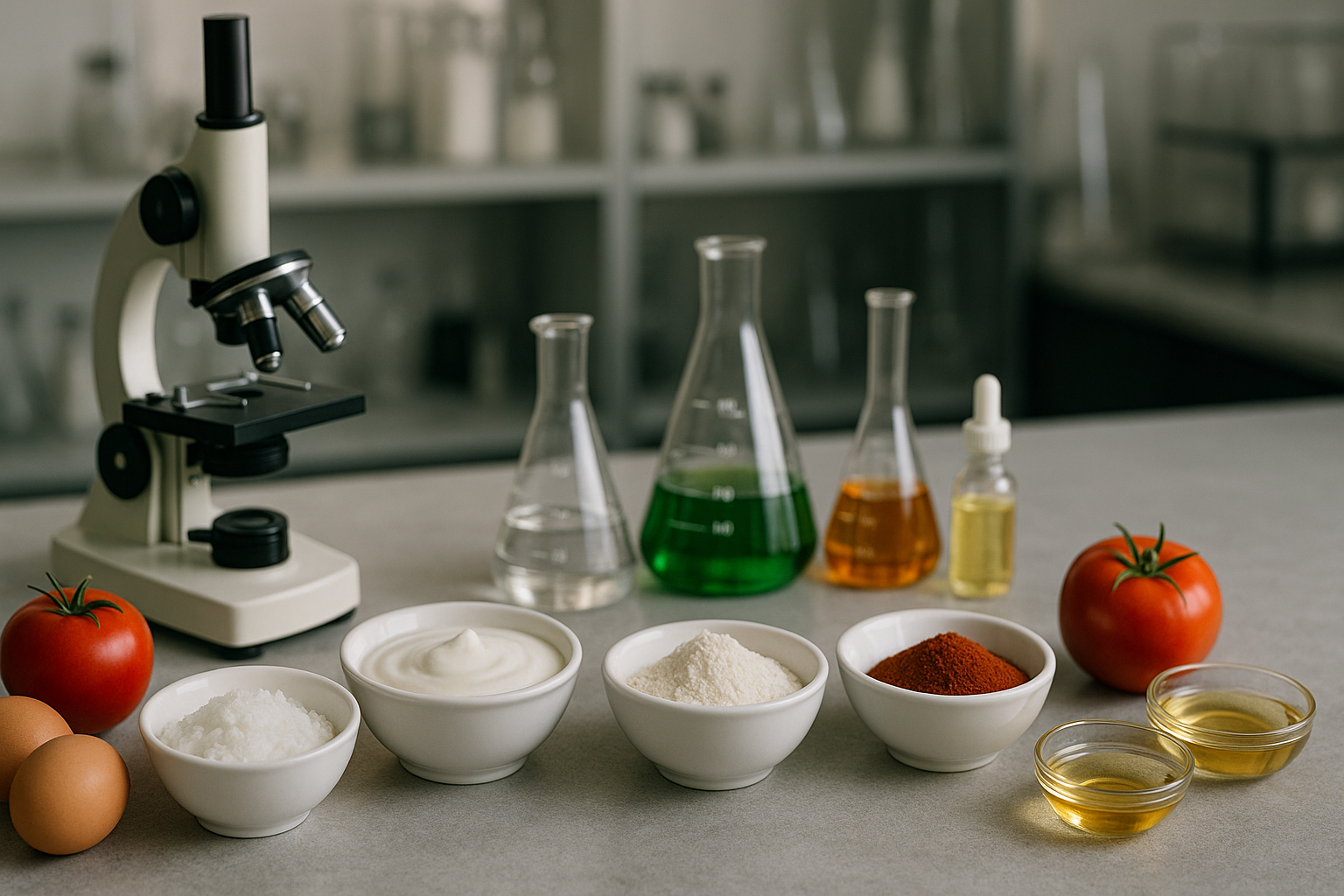
Explaining Sodium Alginate
SUBSCRIBE TO OUR BLOG
Promotions, new products, and recipes.
-
What sodium alginate is, how it's sourced from brown seaweed, and how it works as a natural thickener and gelling agent
-
The wide range of sodium alginate applications across food, pharmaceutical, cosmetic, and industrial industries
-
Key properties—like biocompatibility, temperature stability, and safety—that make it so versatile and effective
-
How to choose the best sodium alginate for your specific needs, from molecular gastronomy to skincare and textile printing
Sodium Alginate Explained: What It Is, How It Works, and Where It's Used
Sodium alginate comes from brown seaweed and is used in many fields. This includes food, pharmaceuticals, and textiles. It's known for its special properties that make it key in many products.
It's great at making gels and thickening liquids. This makes it a favorite among food makers and chefs. The quality of sodium alginate really matters. Finding the best sodium alginate is important for getting the right results.
Key Takeaways
- Sodium alginate is derived from brown seaweed and has various industrial applications.
- It is valued for its gel-forming and thickening properties.
- The quality of sodium alginate affects its performance in different uses.
- Selecting the right sodium alginate is key for achieving desired results.
- Sodium alginate is used in food, pharmaceutical, and textile industries.
What is Sodium Alginate and How Does it Work?
Sodium alginate is a natural thickener used in many products. It's found in food and medicines. Its unique properties make it very useful in different fields. Learn the science behind spherification where sodium alginate plays a key role.
The Science Behind This Natural Thickener
Sodium alginate comes from brown seaweed. When mixed with water, it turns into a thick gel. This happens because it reacts with calcium ions, creating a strong network.
This natural thickener is great for making gels and thick solutions. It's used in food, medicine, and cosmetics. Its ability to gel depends on its concentration, pH, and other ions. See more on how it's applied in hydrogel research.
Key Properties and Characteristics
- Non-toxic and safe for consumption
- Biocompatible and biodegradable
- Effective thickening and gelling agent
- Stable across various temperatures and pH levels
How Sodium Alginate is Sourced and Processed
Sodium alginate comes from brown seaweed, found in the ocean. The process includes extraction, purification, and making it ready for use. The quality can change based on the seaweed and how it's processed.
To get sodium alginate, seaweed is treated with alkali. Then, it's filtered and purified. The result is a white to yellowish powder used in many products. Cape Crystal Brands offers a high-quality powder form of sodium alginate.
The Best Sodium Alginate Applications and Uses
Sodium alginate is a key player in many fields. It's known for its versatility and ability to improve products in food, pharmaceuticals, cosmetics, and more.
Food Industry: Molecular Gastronomy and Beyond
In the food world, sodium alginate is a big deal in molecular gastronomy. It thickens, stabilizes, and emulsifies food, making it better. Chefs love it for creating unique textures like spheres and noodles. Try it with the Direct Spherification Kit.
But it's not just for fancy dishes. Sodium alginate also helps in traditional cooking. It adds texture to ice cream, sauces, and dressings. Its moisture retention and emulsion stability are big pluses in many recipes. More uses are explored in this guide.
Medical and Pharmaceutical Benefits
In medicine and pharmacy, sodium alginate shines. It's safe and works well with the body. It's used in wound care to keep wounds moist and promote healing.
It's also in some medicines, like tablets and capsules. Its gel-forming ability helps drugs release slowly, making treatments more effective.
Cosmetic and Personal Care Products
The beauty world loves sodium alginate for its moisturizing and thickening powers. It's in creams, lotions, and masks to hydrate and soften the skin.
Selecting Quality Sodium Alginate for Skincare
Choosing the right sodium alginate for skincare is key. Look for high-quality, pure seaweed-based products. They ensure your skin gets the best benefits.
Also, check the sodium alginate's viscosity and particle size. These affect how well it works in your products. Quality sodium alginate makes skincare products more stable and effective. It’s also featured in thickening applications across other industries.
Industrial and Textile Applications
Sodium alginate has uses beyond beauty and health. It's used in textile printing to thicken dyes and improve fabric quality. It also forms strong films for finishes and coatings.
It's also in paper making, boosting paper strength and printability. Its wide range of uses makes it a valuable asset in many industries. See how it compares in wall material studies.
Conclusion
Sodium alginate is very useful in many fields. It's used in food, medicine, cosmetics, and textiles. Its special properties make it great for molecular gastronomy, health products, and personal care.
The top sodium alginate comes from the best seaweed. It's made to meet high standards. We've seen how it's used in food, medicine, and more. Explore the alternate spherification kit for more options.
Learning about sodium alginate opens up new possibilities. It's good for chefs, researchers, and product makers. Sodium alginate is a key to innovation and better products. Need more answers? Visit our sodium alginate FAQ hub.
FAQ
What is sodium alginate used for?
Sodium alginate is used in many ways. It's found in food, medicine, cosmetics, and more. It thickens things naturally and is key in molecular gastronomy. It also helps in making some medicines and beauty products.
Is sodium alginate safe to consume?
Yes, it's safe. The FDA says it's okay to eat. It comes from seaweed and has been used for years.
How is sodium alginate sourced and processed?
It comes from brown seaweed, picked from the sea. The seaweed is processed to get alginate. This is then turned into sodium alginate through chemical steps. The final product is filtered and cleaned for use in food or medicine.
Can sodium alginate be used in skincare products?
Yes, it's used in some skincare. It moisturizes and soothes the skin. It makes the skin feel better and look smoother.
What are the benefits of using sodium alginate in food products?
It's great for thickening and stabilizing food. It makes food look and feel better. Chefs use it to make new, exciting dishes.
Are there any allergens or sensitivities associated with sodium alginate?
Some people might react to it. This can cause stomach problems or skin issues. If you have a bad reaction, stop using it and talk to a doctor.

|
About the Author Ed is the founder of Cape Crystal Brands, editor of the Beginner’s Guide to Hydrocolloids, and a passionate advocate for making food science accessible to all. Discover premium ingredients, expert resources, and free formulation tools at capecrystalbrands.com/tools. — Ed |
Enjoyed this post? Subscribe to The Crystal Scoop
Food-science tips, ingredient know-how, and recipes. No spam—unsubscribe anytime.
- Choosing a selection results in a full page refresh.



